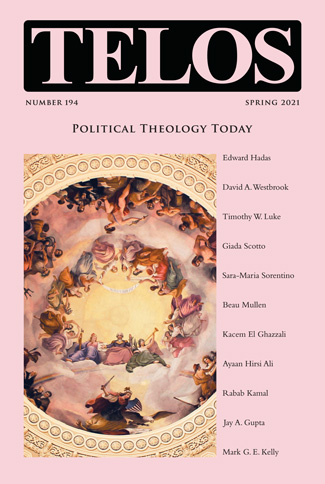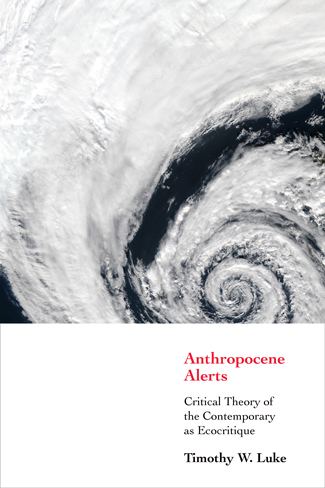 Concerns about inflation can lead us to exaggerate the role of money in the economy. In his essay on “Three Rival Versions of Monetary Enquiry,” in Telos 194, Edward Hadas argues that money is not at the center of economics. Instead, economics is fundamentally about what he calls the “Great Exchange,” in which people offer labor that changes the world and the world in return provides gifts to people in the form of goods and services. At its basis, this exchange involves the relationship between humans and nature, as well as the ways in which humans decide to manage this relationship. Though it can go on with or without money, money is very useful for managing the individual elements of the Great Exchange. As the mediator of the details of the Great Exchange, money is in fact neutral, neither a nefarious underminer of human relations nor a key to prosperity.
Concerns about inflation can lead us to exaggerate the role of money in the economy. In his essay on “Three Rival Versions of Monetary Enquiry,” in Telos 194, Edward Hadas argues that money is not at the center of economics. Instead, economics is fundamentally about what he calls the “Great Exchange,” in which people offer labor that changes the world and the world in return provides gifts to people in the form of goods and services. At its basis, this exchange involves the relationship between humans and nature, as well as the ways in which humans decide to manage this relationship. Though it can go on with or without money, money is very useful for managing the individual elements of the Great Exchange. As the mediator of the details of the Great Exchange, money is in fact neutral, neither a nefarious underminer of human relations nor a key to prosperity.
|
It is probably prudent to start with a clear affirmation that the pandemic is real, that COVID-19 has taken many lives, and that public health measures have been necessary to try to limit the devastation of the disease. No denying here. But it is also evident that the messaging by health authorities has often been confusing, and that has undermined their own credibility: for example, in the shift from initial advice against wearing masks to the current (if inconsistent) mandate to do so. If the science on a particular question is not fully settled, it might be better for the authorities to be honest about that indeterminacy rather than to lay claim to an infallibility they cannot maintain. That clarity, however, would mean a willingness to trust the public to think on its own and to act in the spirit of individual responsibility, instead of issuing orders and vilifying critics. The following essay first appeared in Achgut.com on September 18, 2021, and appears here with the permission of the author. Translated by Russell A. Berman, with comments here. From the very start of the pandemic, corona and climate change have always been mentioned in the same breath. Indeed, the parallels are unmistakable. In both cases it is a matter of invisible threats from natural phenomena. In both cases, the discussion is shaped by scientists with data and modelings that are difficult to follow, as they demonstrate the need to limit personal freedoms. In both cases, large parts of the population submit to these prohibitions and limitations on freedom. In both cases, we have seen radical movements emerge, like Fridays for Future, Extinction Rebellion, and Zero-Covid, that demand even more extreme measures, reminiscent of charismatic conversion cults and chiliastic sects. In both cases, “deniers” and “skeptics” are denounced as dangers who stand in the way of preventing a catastrophe. After the COVID lockdown, a climate lockdown will take place, with the one transitioning into the other seamlessly. Worse than the concrete fear of some life-threatening reality, such as in the past the Spanish flu or today COVID-19, is the anxiety nourished by the imagination of terror. This is the business of the modern prophets of the apocalypse, who usually show up in the guise of science. They lend support to the great religion-substitute of an infinite environmentalist worry, with which the Party of Prohibitions exploits the guilty conscience of an affluent society. Instead of “What can I hope for?”—a question for which one used to expect an answer from Christianity—they ask: “What must I fear?” This accords to the presumed wisdom of children who want to carry out a world tribunal to save the earth. New from Telos Press: Anthropocene Alerts: Critical Theory of the Contemporary as Ecocritique, by Timothy W. Luke. Order your copy in our online store, and save 20% on the list price by using the coupon code BOOKS20 during the checkout process.
The vulnerability we confront in the Anthropocene is what Jonathan Lear has called ontological vulnerability: the possible collapse of our world, that is, the collapse of the taken-for-granted way of life that guides and orients us in our everyday practices. In this paper, we take up Lear’s claim that in the face of the impending collapse of one’s world, a peculiar form of hope, radical hope, is called for. According Lear, radical hope means holding on to a “commitment only to the bare possibility that, from this disaster something good will emerge.” |
||||
|
Telos Press Publishing · PO Box 811 · Candor, NY 13743 · Phone: 212-228-6479 Privacy Policy · Data Protection Copyright © 2025 Telos Press Publishing · All Rights Reserved |
||||



